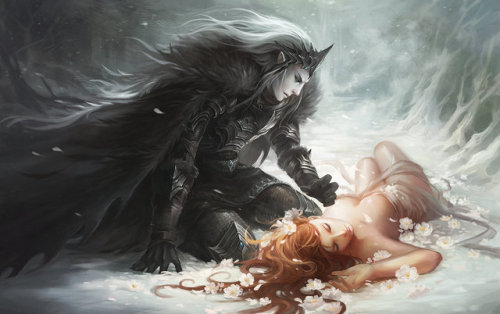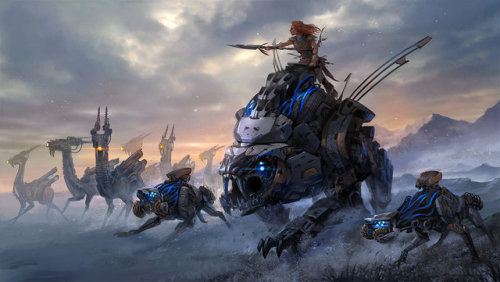Katherine Frances's Blog, page 59
March 23, 2018
–[x]
gracebabcockwrites:i step out intoan icy landscape.i search the skyfor traces of spring stormsthat...
i step out into
an icy landscape.
i search the sky
for traces of
spring storms
that might pave
the way for green
to emerge.
the winds are
uncertain
but i’ll take
uncertainty
as a promise.
as hope.
March 22, 2018
For part one in which I provide an in depth explanation of what Deus Ex Machina means and why it’s...
 How can I tell if I’ve written a Deus Ex Machina, and how can I fix it?
How can I tell if I’ve written a Deus Ex Machina, and how can I fix it?How can you tell if your own ending is Machina-y, because it’s easy to see it in the over the top examples I gave in part one, but not always so obvious to us in our own work. So here’s what to do and what to look for.
Examine the ending. Machinas come at the climax when the plot is being resolved. It’s not really an issue to use a Machina on a tiny side sub plot most of the time, because if the stakes aren’t high anyway, the reader won’t really care or feel like the character cheated their way out of trouble. So mainly, just worry about the climax.
Ask yourself:
-How does the resolution come about? If the answer to this question has nothing to do with your main character’s actions (not just their existance, but something they actually worked for or did), then you may have a Deus Ex Machina on your hands.
-Could the reader guess the ending? If there was illusion to or mention of your ending as a possible ending, then it’s probably not a Deus Ex Machina, because it didn’t come out of nowhere. Ex: “The ingredients the Evil Doctor is using are so highly explosive, we could just blow them up!” Even if the main character doesn’t do it, and someone else blows up said ingredients in a surprising manner, we still knew it was on the table, so it’s probably not a Machina.
-Does the character deserve it? Even if the main character didn’t create the ending, if they have been actively working toward a goal that has ever eluded them and the reader feels like they deserve that ending, giving it to them even through a god coming down from heaven won’t feel as cheap, because the character earned it, even if none of their actions amounted to anything. On the other hand, if you have a very passive character who is just being moved about by the plot, giving them an easy out will probably feel like a Machina in most cases.
-Is there any foreshadowing of this possibility? If you drop hints, even metaphorical and vague hints of a certain ending, that ending coming to pass won’t surprise the reader so much that their going to go, “Oh, how ‘effing convenient” and shut the book and walk away.
If you don’t meet the majority of these criteria, you probably wrote a Machina. That almost rhymes.
Anyway, you should meet most of these criteria with your plot climax/resolution. If you found you were coming up short in two or three of these areas, you might have a Machina-y ending. But don’t quit now! You can fix it! Here’s how!
-Make your story as character driven as possible. This is probably the most straightforward and sure-fire cures of a Machina, but it’s not always doable. Some of us write plots that are very large in scope and sort of out of the character’s hands, like an alien invasion for example. But do your best to have the character drive the story to the resolution, even if that resolution isn’t all their doing. Even if this won’t work for you because your plot must end in a way that wasn’t driven directly by your character, you can do all or some of the following other things to help it feel less Machina-y.
-Give the stakes. Be your own judge, but if stating the stakes doesn’t totally ruin the tension of your story, it might seriously help your reader believe the ending. State at some point some of the possible ways this story could end, so that when one of them happens out of your character’s hands, the reader sort of saw it coming. For example, if you know there is One Big Bad that will stand in the way of your resolution, maybe mention their Greatest Weakness, so that when that weakness ultimately defeats them, the reader won’t call last minute Machina plot fix.
Make your character worthy. I might just be a sadist, but this usually means suffering. If your character gets a happy ending that they themselves didn’t cultivate, you need to prove to the reader that they at least deserve it. Put the character and the reader through hell attempting to reach the resolution and failing. By the time your character is handed the resolution they’ve been working for, it will be more of a relief for the reader, and less of a cheap cop out.
Foreshadow that bitch. If all else fails, foreshadowing is your saving grace and can probably fix just about any Deus Ex Machina. Well at least, let me put it this way, if you can’t foreshadow your plot resolution, then it’s probably not a good resolution. Remember, foreshadowing isn’t just telling the reader upfront what’s going to happen. It’s more like whispering a sensual what if in their ear through the subtext of the book. If the villain’s gun is going to be out of bullets, foreshadow that bitch by showing the henchman forgetting to load the guns in previous scene. Cheesy example, but you get it.
Machi-NotsTo drive this point home, I’m going to do what I always do, which is blatantly disagree with popular opinion.

There are many plot resolutions labeled as Deus Ex Machina’s that really aren’t. Remember, a Deus Ex Machina comes out of no where and has nothing to do with the skills, personality, or existence of the main character. The villain is standing on the sidewalk, about to kill our hero, and they’re hit by a car before they can pull the trigger. Here are two examples I always see referenced as Machinas that I don’t agree with:
Sword of Godric Gryffindor in Harry Potter and the Chamber of Secrets: It’s true, when Harry pulls the sword out of the sorting hat, and we get Phoenix tears healing wounds, it is certainly borderline Machina-y. However, we are told that the sword only appeared to Harry because of his actions, a claim that is relatively backed up by the rest of the story. We also feel that Harry at this point as earned a saving grace, or most people would. He actively figured out the Chamber of Secrets and went through a lot of trouble and failures to do so. It wasn’t made easy for him. He’s also a child, and this is a children’s book, so the convenient ending matches the tone better than if this were adult fiction. There is also foreshadowing of this ending, because we know about the sword, we know about the Phoenix, and we see that the cover of the fucking book is a Phoenix literally carrying Harry so come on, if you were too slow to put the two together, don’t blame J.K. Just sayin’. But, I will agree, it’s treading on a fine line.
The Bacteria that killed the invading aliens in War of the Worlds: What?! Certainly you can’t be suggesting that aliens getting colds is an acceptable ending to a alien-war movie. I am. I am suggesting that. This is an example where the metaphorical meaning of what’s happening is more relevant than the character’s actual actions or causation of the resolution. The viewer might never be told that the aliens might catch a cold, but that ending shouldn’t feel too unfamiliar to us… because that’s the story of American colonization. And this was an American film, so it’s assumed that the viewers know the story
(like in traditional Greek Machinas which were never considered a bad thing, that the viewers know the Gods)
. An invader comes in, impossibly strong and undefeatable, and for their imperialistic cockiness, they catch the Montezuma’s Revenge! So it’s not out of no where, and it’s almost foreshadowed in the terminologies used in the movie. Furthermore, in this unusual case, the literary beauty of what’s happening makes the ending feel fair. The aliens (inherently an undeserving villain, because hey were’re all rooting for the humans) were killed by the very earth they were attempting to destroy. “By the toll of a billion deaths, Man had earned his immunity, his right to survive among this planet’s infinite organisms.” (and Morgan Freeman says it, so like… come on.) Now, could this have benefited from some stronger foreshadowing, perhaps evidence earlier on that the aliens were getting sick, sure. But all and all I would call this a successful Machi-Not.
There’s plenty more that I don’t agree with, but take these examples simply to mean that, despite what you might have heard, Deus Ex Machina-like endings are not a death sentence. It can be made better by a few easy steps, and sometimes can be an even better ending than one where the main characters defeat the bad-bad by their own hands.
I hope this was informative. Please feel free to open the dialogue if you agree/disagree with something I said!
Click here to check out other writing advice posts and more in my Writer’s Library!
writing tip #1259:
suivezlalune:
For war and fighting scenes
Types of Weapons:
Aircraft:
air-dropped bombair-launched...
For war and fighting scenes
Types of Weapons:
Aircraft:
air-dropped bomb
air-launched missile
air-launched rocket
air-launched torpedo
Anti-aircraft
Flamethrowers
Firearms:
assault rifle
battle rifle
blow forward firearm
bullpup
carbine
delayed blowback firearm
firearm
grenade launcher
machine gun
multiple barrel firearm
pistol
shotgun
sniper rifle
submachine gun
recoilless rifleKnives:
ballistic knife
bayonet
boning knife
butterfly knife
carving knife
combat knife
dagger
fighting knife
karambit
rampuri
shiv
throwing knife
trench knifeMissiles:
Conventional guided:
air-to-air missile
air-to-surface missile
anti-ballistic missile
anti-satellite weapon
anti-ship missile
anti-submarine missile
anti-tank guided missile
land-attack missile
shoulder-launched missiles
surface-to-air missile
surface-to-surface missile
wire-guided missileCruise missile:
air-launched cruise missile
ground-launched cruise missile
submarine-launched cruise missileBallistic missile:
tactical ballistic missile
short-range ballistic missile
theatre ballistic missile
medium-range ballistic missile
intermediate-range ballistic missile
intercontinental ballistic missile
submarine-launched ballistic missile
air-launched ballistic missileRockets:
military rocket
orbital launch system
sounding rocket
upper stageTorpedos
Kicks:
axe kick
back kick
butterfly kick
calf kick
cartwheel kick
cut kick
double front kick
downward roundhouse kick
foot sweep kick
flying kick
front kick
heel kick
hook kick
jumping kick
knee joint kick
low kick
oblique kick
push kick
roundhouse kick
scissor kick
scoop kick
shin kick
side kick
skipping axe kick
skipping front kick
stomp kick
stretch kick
switch kick
toe kick
twisting kick
upkick
uppercut back kickPunches and Hand Strikes:
backfist
cross or straight
double fist punch
ear clap
elbow strike
eye strike
finger poke
jab
long fist
hammer fist
hook
overhand
palm strike
slap
sucker punch
tiger claw
uppercut
upset punch
Spank: smack, slap, beat, strike, hit.
Swat: blow, flick, flip, slip,
Push: nudge, bump, shove.
Scratch: ich, rub, fret.
Smash: blow, knock, bump, bang, bash.
Slam: flap down, throw, shove.
Bite: grip, gnaw, snap, nip, nibble.
Cut: slice, rip, slit, carve, gash, chop, bore, stab.
Bruise: harm, injure, wound, elicit, evoke, crush, damage.
Dodge: avoid, sidestep, evade, duck, quibble, shrink.
Escape: fly, run away, flee, slip, get away, break, pull back.
Disable: confine, restrain, layup, hold, incapacitate, contain.
Block: obstruct, stop, blockade, shut off, impede, close off, barricade.
Resist: balk, refuse, spurn, disobey, reject.
Hesitate: waver, falter, doubt, oscillate, delay, pause, vacillate.
How to Spot an “Info-dump”
I got a great question in my Ask recently from someone wanting to know how to identify an info-dump in their writing. Here’s my response!
For those who don’t know, an info-dump refers to areas of a story where a writer gives a long expository description, either in narrative or in dialogue, where they are basically “dumping” a bunch of information on the reader all at once, as opposed to revealing it naturally throughout the story.
Signs of an info-dump:
Read your passage out loud. Do you get bored? You might be info-dumping.
Has
all conflict in your story come to a screeching halt while you spend
more than 1-2 paragraphs explaining something to the reader? You might
be info-dumping.
Are two characters telling each other things they already know for, like, a long time? You might be info-dumping.
If
invited to read your work publicly, would you definitely NOT read that
passage, because “nothing really happens” and you worry the audience
would get bored listening to it? It could be an info-dump.
Signs that you are probably not info-dumping:
Have you woven in necessary backstory and information in 1-3 sentence bursts throughout your story? Not an info dump.
Does
a character spend a short paragraph or two explaining something to
another character that they didn’t already know, for a good story
reason? Not an info dump.
Do you keep the story going and keep
conflict and tension alive while you gradually show your reader what’s
going on? Not an info dump.
Do you have just a few
sections where you spend 200-300 words or less explaining something to
the reader? As long as your story is on the longer side, you’re probably not doing too much info-dumping.Again,
these are just general guidelines. After you finish your story, though,
you might want to give it to a friend or fellow writer to give you
feedback and let you know if they spot any areas that are too thick with
exposition.Also keep in mind that whether or not a writer is info-dumping can be subjective
as well as genre-sensitive: Not everyone will agree about what makes a
passage an info-dump or not, and if you’re writing a complicated fantasy
with a lot of world-building and history, giving your reader a ton of
info can be necessary at some stages. Also, readers of fantasy tend to
be more tolerant of it because it comes with the territory sometimes. But these general guidelines should help.
Dialogue Prompt
“Have you ever just wanted to tell someone you loved them?”
“Why haven’t you?”








